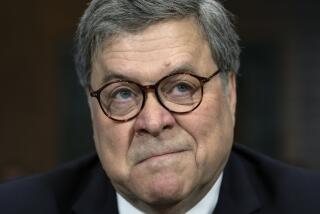Release of Terrorism Memos Angers Bush
- Share via
WASHINGTON — In a rare rebuke, President Bush expressed disappointment at his own Justice Department on Thursday, suggesting that it had improperly injected partisan politics into the work of the commission investigating the Sept. 11 attacks by releasing documents intended to raise questions about a Democratic panel member.
Bush expressed his displeasure at the start of a commission interview at the Oval Office. Bush and Vice President Dick Cheney met with the 10-member commission for more than three hours.
Later in the day, White House Press Secretary Scott McClellan told reporters about Bush’s comments critical of the Justice Department.
Commission chairman Thomas H. Kean also said that Bush expressed those sentiments to the panel.
Bush “doesn’t believe that there ought to be finger-pointing. We ought to all be working together to learn the lessons of Sept. 11,” McClellan said.
The controversy involves commission member Jamie Gorelick, who was a deputy attorney general during the Clinton administration. Her role in federal counterterrorism efforts were scrutinized this month when Atty. Gen. John Ashcroft, a former Republican senator from Missouri, declassified a 1995 memo and gave it to the Sept. 11 commission. The memo, written by Gorelick, instructed federal officials to keep counterintelligence “more clearly separate” from criminal intelligence.
That memo raised eyebrows because of a widely held belief after Sept. 11 that closer communication between the CIA and FBI was needed to combat terrorism -- and that the traditional “wall” between counterintelligence and criminal investigators was an impediment to thwarting terrorist attacks.
After Ashcroft released the memo, during his appearance before the commission, some Republican lawmakers, called on Gorelick to resign. She refused, and was strongly supported by Kean and other commissioners.
But on the eve of Thursday’s joint Bush-Cheney session with the commission, the Justice Department released additional Gorelick-related memos, posting them on its website. The agency’s action prompted Bush’s remarks to the commission that he was “disappointed” in the Justice Department.
At a briefing, McClellan refused to specify how the White House conveyed the president’s unhappiness to the Justice Department, saying only that the message had been delivered “at the staff level.”
A Justice Department spokesman, Mark Corallo, would neither comment nor say whether the department planned to remove the documents from its website.
As of Thursday evening, the documents were still on the site.
But as Bush sought to maintain an above-the-fray posture, 13 Republican senators stoked the controversy, sending the commission a letter calling for Gorelick to testify before her own commission.
One of those, Sen. John Cornyn of Texas, also came to the Justice Department’s defense, issuing a statement saying that the agency had produced the Gorelick memos at his request.
“My request to Justice was in response to the 9/11 commission’s failure to hear testimony from a key Clinton administration Justice Department official,” Cornyn said. “I’m glad the documents were released. Otherwise, we may never have known the full extent of the growth and buttressing of ‘the wall’ that we can all agree led to many of the intelligence failures before 9/11.”
In his briefing, McClellan appeared intent on dispelling suspicions that the White House was covertly condoning the new Gorelick memos while publicly condemning their release.
“We were not involved in it. I think the president was disappointed about that,” McClellan said. “The president does not believe we ought to be pointing fingers in this time period. We ought to be working together to help the commission complete its work.”
Kean, a former Republican governor of New Jersey, defended Gorelick in an interview.
“Jamie Gorelick is a good commissioner and has abided by every rule of the commission, recusing herself from anything she was involved in,” as have other commissioners, Kean said.
Bush’s criticism of the Justice Department -- while rare in an administration known for its strict adherence to the president’s wishes -- underscored the occasional tension in Ashcroft’s relationship with the White House, caused by his tendency to stray from the administration’s message.
To some observers, Bush’s rebuke recalled a June 2002 incident in which Ashcroft announced the arrest of “dirty bomb” suspect Jose Padilla and the discovery of “an unfolding terrorist plot to attack the United States” in a dramatic appearance before TV cameras during a trip to Moscow.
White House officials, who normally clear all major pronouncements by Cabinet secretaries, fumed that the attorney general had not alerted them to his intentions. This week, Padilla challenged his detention in a military brigade before the Supreme Court.
Times staff writers Greg Miller and Richard B. Schmitt in Washington contributed to this report.
More to Read
Get the L.A. Times Politics newsletter
Deeply reported insights into legislation, politics and policy from Sacramento, Washington and beyond. In your inbox three times per week.
You may occasionally receive promotional content from the Los Angeles Times.










